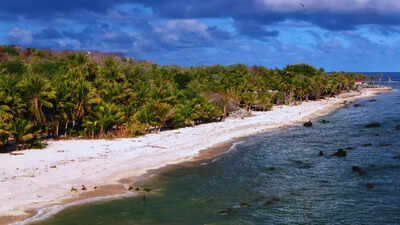Trending
World’s third-smallest country, Nauru, sells citizenship to tackle climate crisis; here’s what we know
Nauru is offering citizenship for USD 105,000 under its Economic and Climate Resilience Programme to fund climate change mitigation and population relocation. With just 21 square kilometers of land, Nauru faces significant environmental challenges. The initiative aims to gather revenue for relocation and sustainable living, with strict vetting standards for applicants.
Nauru, a tiny island nation in the Pacific, is offering citizenship for USD 105,000 (approximately INR 91.5 lakh) under its Economic and Climate Resilience Citizenship Programme. If reports are to go by, the move aims to raise funds to combat climate change and relocate its population of around 12,500 to higher ground as rising sea levels threaten its existence.
As per reports, the initiative was launched last year, and has already begun receiving applications, with officials aiming for 66 successful applicants this year and a total of 500 over time. The revenue generated—approximately Euro 50 million (INR 453 crore)—would account for nearly 20 percent of the country's government income and largely fund the relocation project.
Also read: No test, no stress: 10 countries where your Indian license works!
Nauru covers just 21 square kilometers, and is located in Micronesia, northeast of Australia. The island has long struggled with environmental and economic challenges, with nearly 80 percent of its land rendered uninhabitable due to excessive phosphate mining since the early 1900s. As a result, most of its population is forced to live along the vulnerable coastline, which faces threats from rising sea levels, coastal erosion, and storm surges. The government estimates that relocating its citizens and establishing a new sustainable community will require approximately INR 545 crore.

Reports also state that strict vetting standards would be enforced, ensuring that only investors who align with Nauru’s values and pass rigorous background checks receive citizenship.
A Nauruan passport currently allows visa-free access to 89 countries, including Ireland, Hong Kong, the UAE, Singapore, and the UK.
Also read: PM Narendra Modi calls for year-round tourism growth in Uttarakhand; key details here
With climate change accelerating and the island's resources dwindling, Nauru’s golden passport programme is seen as a last-ditch effort to secure a livable future for its residents. Whether this ambitious plan succeeds in raising the necessary funds while maintaining strict security remains to be seen, but for now, the island nation is banking on global investors to help it survive the coming environmental crisis.
End of Article
FOLLOW US ON SOCIAL MEDIA
Visual Stories
Tired of too many ads?









